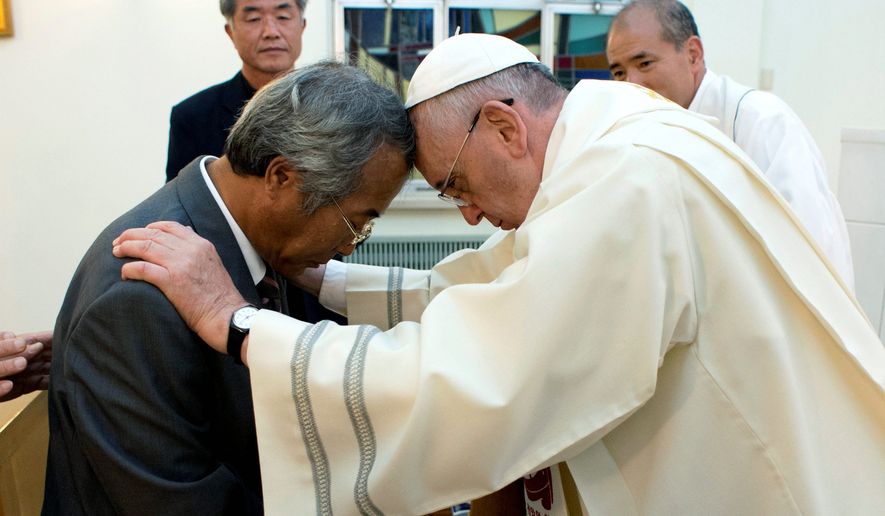Pope Francis on Sunday called on Catholic bishops in Asia to promote a “fraternal dialogue” among the peoples of Asia, stressing the need to “walk together” — comments widely seen as an outreach to China and other Asian nations with whom the Vatican has no diplomatic ties.
On the fourth day of his historic five-day visit to South Korea, Francis addressed about 80 of the region’s bishops.
“In this spirit of openness to others, I earnestly hope that those countries of your continent with whom the Holy See does not yet enjoy a full relationship may not hesitate to further a dialogue for the benefit of all,” he said, deviating from his prepared text to add that he is “not talking here only about a political dialogue but about a fraternal dialogue.”
“These Christians aren’t coming as conquerors; they aren’t trying to take away our identity,” Francis said, adding that the important thing is to “walk together.”
Vatican spokesman the Rev. Federico Lombardi confirmed that the 77-year-old pope’s remarks were “obviously a sign of goodwill for dialogue” with China and other countries, such as North Korea, Vietnam, Myanmar, Laos, Bhutan and Brunei.
“This offer of the pope for dialogue is to all these lands and not just one, even if China is the biggest,” Father Lombardi said.
SEE ALSO: Pope to Koreas: Avoid ‘fruitless’ shows of force
There was no immediate response from Beijing authorities, either from the government or the official Chinese Catholic Patriotic Association.
On Thursday, after the pope sent greetings to Beijing’s leadership as he flew through China’s airspace with permission, Chinese Foreign Ministry spokeswoman Hua Chunying told state-run media that “we have noticed the remarks of Pope Francis.”
“We are willing to keep working hard with the Vatican to carry out constructive dialogue and push for the improvement of bilateral ties,” the ministry said, according to a statement received by Reuters.
The Vatican has not had diplomatic relations with China since 1951, when Beijing cracked down on Catholics who did not obey its communist rule.
The Chinese Catholic Patriotic Association was formed as an alternative to the Vatican-led Catholic Church; it has about 5 million members and is led by clergy appointed by Chinese leaders.
China also is believed to have millions of Catholics who are loyal to Rome and part of an underground network.
SEE ALSO: Gridiron diplomacy: American football comes to China, and a billion potential fans
In 2007, under then-Pope Benedict XVI, the Vatican sought to improve ties between the state-sanctioned church and the underground church. But China’s leadership has long-appointed Catholic bishops, and today it chafes over the Vatican’s diplomatic ties with the democratic island of Taiwan, which Beijing claims as its own.
Father Lombardi stressed that the Vatican has long been open to dialogue and is not interested in questions of political sovereignty.
“Authorities have not to fear the Holy See as a power that comes to exercise its foreign powers in the land. [Rather it] is a religious authority that is of another order than the political and civil authorities,” he said.
He added that Francis’ remarks to the bishops was a clear call for them to seek dialogue and to use charitable and education services as the ways to connect with people of all cultures.
During the first papal trip to South Korea since 1989, Francis on Saturday beatified 124 Korean martyrs in front of a crowd of about 800,000 people.
He also baptized the father of one of the victims of the April sinking of the Sewol ferry. Lee Ho Jin took the Christian name of “Francis” during the rite, which the pope administered in the Vatican Embassy in Seoul, Father Lombardi said.
Francis stopped to pray at a monument for aborted babies — a garden filled with simple white crosses — and spent time with disabled Koreans who live in the Kkottongnae community. The enclave was founded by a priest in the 1970s to take in disabled children and adults who were abandoned by their families. Francis embraced and touched the residents and accepted an origami crane that one woman had created with her feet.
At a Saturday meeting with Asian youth, Francis urged them to bear witness to the Gospel of Jesus Christ and build a world of friendship and peace “together with young people everywhere.”
“[I]n this generation, the Lord is counting on you. Are you ready to say ’yes’ to him? Are you ready?” he said.
Francis offered a Mass at the close of Asian Youth Day in Haemi Castle, where more than 100 Korean martyrs were tortured and killed in the 1700s and 1800s.
On Monday, the pontiff will offer a Mass of peace and reconciliation in Seoul’s largest Catholic church, the Myeong-dong Cathedral. It is expected that his words there will address the divisions in North and South Korea.
A handful of elderly Korean women who were used as sexual slaves, or “comfort women,” by Japanese military during World War II are expected to have front-row seats at the Mass and meet with Francis.
• This article is based in part on wire service reports.
• Cheryl Wetzstein can be reached at cwetzstein@washingtontimes.com.




Please read our comment policy before commenting.